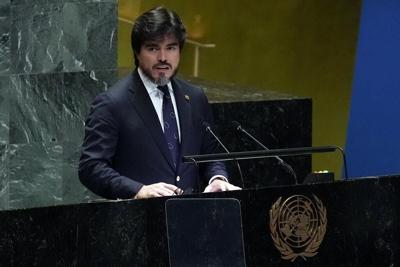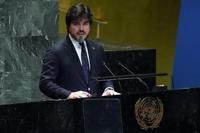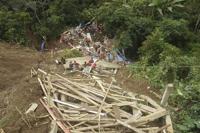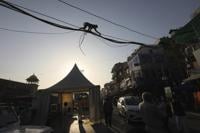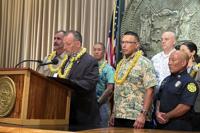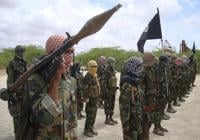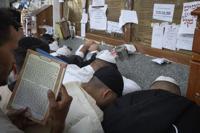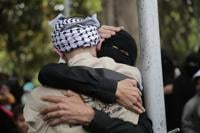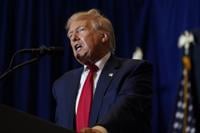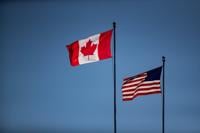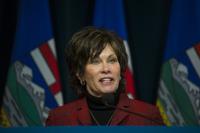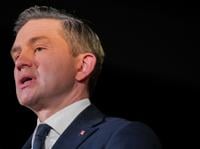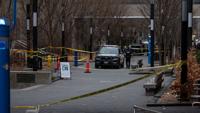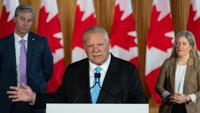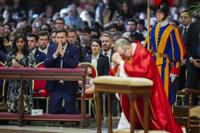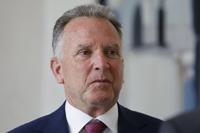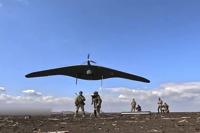UNITED NATIONS (AP) — North Korea condemned the United States and its allies Monday for “stirring up military confrontations still further" by engaging in war games in the Asia-Pacific region and “talking unceasingly” about regime change in the diplomatically isolated nation. U.N. Ambassador Kim Song said North Korea was taking unspecified steps to defend itself better.
The words from Kim, while sharp, did not appear to represent any notable departure from Pyongyang's usual rhetoric. He spoke on the final day of the U.N. General Assembly's high-level meeting of world leaders — a day when some of the world's most diplomatically isolated nations took the rostrum alongside a diverse roster of leaders from nations like Canada and the United Arab Emirates.
Kim said the United States, trying to dominate world affairs, was not acting fairly to the community of nations and was misusing the ostensibly multilateral United Nations for its own ends.
“They are stirring up military confrontations still further,” Kim said, accusing Washington of hypocrisy — another common charge from North Korea. “Who has developed and used nuclear weapons for the first time in human history? ... Who is talking unceasingly about the end of a regime of a sovereign state?”
He added: “The United Nations is misused for the political aims of an individual country. Such realities should no longer be tolerated and allowed.”
As he spoke, a lone U.S. diplomat intently scrawled notes on paper. Asked later for a response, the U.S. State Department said it was the North — with its own nuclear weapons program — that was raising the temperature of discord surrounding the Korean Peninsula.
“There are a number of valuable discussions we seek to have with the DPRK, including on reducing the risk of inadvertent military conflict on the peninsula,” the State Department said in a statement, using an abbreviation for the North’s formal name, the Democratic People’s Republic of Korea.
But instead of engagement in such discussions, “we have seen a marked increase in the scope and scale of DPRK provocations, which have only served to raise regional tensions and increase the risk of accident or unintentional escalation,” the statement said.
North Korea is responding to U.S.-South Korea drills
U.S. and South Korean troops held a large-scale exercise last month aimed at strengthening their combined defense capabilities against nuclear-armed North Korea, which again accused the allies of practicing an invasion.
The annual summertime exercise came amid heightened tensions on the Korean Peninsula as the pace of both North Korea’s weapons demonstrations and the U.S.-South Korea combined military exercises have intensified. At the time, the North released a statement calling the exercises “provocative war drills” and said they justified Pyongyang's nuclear ambitions.
In a rebuttal later in the assembly hall, a South Korean diplomat called the North's claims groundless and said its pursuit of nuclear weapons and ballistic missiles was the root of the tensions.
“It is our duty, like any member state, to protect the lives and safety of our people from the DPRK's military threat by maintaining a robust South Korea-U.S. combined defense and deterrence posture,” deputy U.N. Ambassador Sangijn Kim said.
The U.S. State Department said the military exercises were “routine and defensive in nature.”
Kim's speech resembled his last year, when he said the United States was trying to provoke a nuclear war. He also said that Pyongyang was bolstering its defenses to match the “hegemony” it says threatens it. “We continue to increase our war deterrence capabilities," Kim said.
The 1950-53 Korean War ended with an armistice instead of a peace treaty, leaving the Korean Peninsula divided and — technically — still in a state of war.
Some players weren't there to speak
Notably absent from the 190 speakers who addressed the assembly over six days: representatives from Myanmar and Afghanistan, both of which are in U.N. limbo after new regimes took over in recent years.
Afghanistan wasn't totally absent from the debate Monday. Irish Foreign Minister Seán Fleming demanded a “non-negotiable” commitment to gender equality there. And Canada's foreign minister criticized the ruling Taliban for their restrictive and the impact such laws have on Afghan society. “The Taliban," Melanie Joly said, “cannot make international law disappear through simple decrees.”
On a morning peppered with denunciations of “hegemony,” Burkina Faso’s top diplomat said the U.N.’s treasured concept of multilateralism – broad-scale decision-making that gives all countries a voice on the issues facing the planet – is “exhausted,” its reputation “neutered, time and time again, by predatory actions by certain member states who have decided that they are the masters of the world.”
“The harmony and cohesion of our world is at stake,” Foreign Minister Karamoko Jean Marie Traore said. “We’d like to appeal to the powers of our world to prioritize an inclusive global governance which is rid of hegemonizing visions. And if we can do that, the U.N.’s glory will again be restored.”
Less powerful nations criticize U.N., West
Syrian Foreign Minister Bassam Sabbagh, who represents another relatively isolated nation, also said the U.N.'s brand of multilateralism has stopped working — if, he said, it ever had. He cited what he called “terrorist” crimes of Israel since Hamas attacked Israelis on Oct. 7, 2023, and Israel responded swiftly and fiercely in Gaza. Israel says it is only defending itself.
“Chaos is spreading,” Sabbagh said. “All that has happened has revealed the true intentions of the collective West. The United States has prevented the (Security) Council from fulfilling its responsibility to confront threats to international peace and security.”
Said the United Arab Emirates' foreign minister, Shekh Shakhboot Nahyan al-Nahyan, on the same topic: “Even wars have rules.”
Meanwhile, the foreign minister of Nicaragua, Valdrack Ludwing Jaentschke Whitaker, said small nations like his would never back down — even in the face of major powers.
To “our invaders, those interventionists that are dressed in sheepskin, that have the faces of wolves," he said, "we are peoples rich in culture, resources and community models. We are rich in values that have been disowned, distorted, slandered or worn down. We will not allow ourselves to be converted into needy beggars.”
___
See more of AP’s coverage of the U.N. General Assembly at

